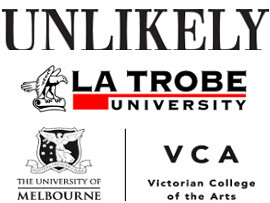Unlikely is a transdisciplinary journal, which opens unexpected spaces for artistic exchange and scholarly conversations across mediums, disciplines and continents. Unlikely supports the research community of practitioners, makers, and scholars working in the creative arts.
This international, peer-reviewed publication presents the opportunity for artists working in practice-led research to engage in conversation with a range of scholars on contemporary concerns. As an experiment in form, Unlikely engages its audience and contributors in a two-stage process of themed live event, presenting creative practitioners’ works, followed by peer-reviewed electronic publication of art works and essays on the issue’s theme.
Unlikely journal welcomes proposals that respond to the provocation of each issue and contributes to the conversation about practice-led research in the arts. It welcomes proposals for guest-edited issues.
Journal issue 3: “cancelled”
Guest editor: Maia Nichols
Contributors: Peter Burke, Renee Carmichael, Alba Mayol Curci, Alice Desmond, Nancy Mauro-Flude, Kutlu Gürelli, Ian Haig, Meliti Kontogiorgi, Manuel Lima, Jesus H. Mayor, Jahnne Pasco-White, Zeny May Recidoro
They say “the time of heroes is over” (Bernadette Corporation, Get rid of Yourself, 2003), hoping to bury with it all forms of heroism. Certain key aspects of society are irretrievable, crossed out, eliminated. On the one hand, some act purposefully under the guise of nonchalance, taking up a void status as strategic positioning. These can be seen to act up, “be unruly,” or to act out, “behave anti-socially” within the world. On the other hand, the impetus for cancelled was to consider agency and alternative models of questioning globalized capital, by rethinking the productive legacy of nihilist strategies and their temporal effects.
The exhibition invited artworks that considered how the fields of communication, hacking, design, architecture, activism, scientific or artistic practices produce effects through cancellation, deflection, or discretion. The essays confronted the tensions between strategies of objectification and tools of abstraction versus the glorification of self-hood, expressionism and the individual. Works were sought that addressed specific forms of spatial orientation and the advantages and pitfalls of strategic desertion, drop -outs, or purposeful self-removal.
Journal issue 4: “Art & Herbarium”
Guest editors: Tom Bristow, Jan Brueggemeier and Danielle Wyatt
Contributors: Anna Artaker, Erica Boito, Bibi Calderaro & Margaretha Haughwout (Coastal Reading Group), Danielle Clode, Bonny Cassidy, Katerie Gladdys & Anna Prizzia & Melissa Desa, Laura Eliaseh, Amanda Johnson, Emma Lansdowne, Emma Robertson, Josh Wodak
Herbaria and natural history archives must be more than repositories for artifacts and scientific information. Curators of these collections are aware that while the archives have always been invested with human passions, natural collections are now laden with distinctly contemporary affect as “nature” comes under threat from global challenges like species extinction, habitat loss and the impacts of man-made climate change. While natural collections institutions aim to improve our ecological futures through scientific research, it is clear that ecological literacy also requires involving diverse publics in more embodied, empathetic and ethical relationships with the natural systems that sustain our life on this planet. As vivid communicators, artists are agents for shaping a ‘pedagogy of feeling’ for the archive, building new kinds of relationships with natural collections and the multispecies worlds they index—which leads well beyond the walls of any natural collection archive.
Expression of interest to edit an issue of Unlikely
Unlikely welcomes proposals for guest-edited issues, including the two-stage process of a themed live event, presenting creative practitioners’ works, followed by peer-reviewed electronic publication of art works and essays.
Please send proposals to info [at] unlikely.net.au.
Unlikely – Journal for Creative Arts & Unlikely Publishing, ISSN 2205-0027
La Trobe University and Victorian College of the Arts, Faculty of Fine Arts and Music, University of Melbourne



